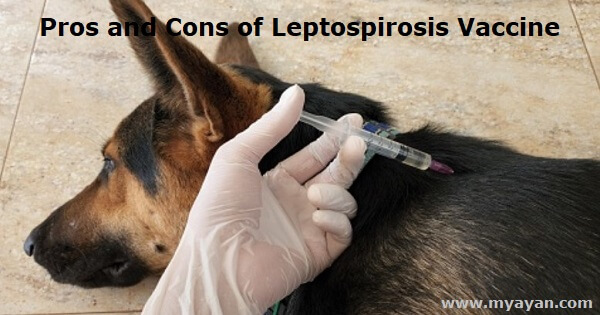There’s a new outbreak in dogs which is affecting canines in NYC. Leptospirosis is a bacterial disease that affects many animals, including dogs. Leptospirosis is a bacterial illness that may result in various other detrimental and deadly diseases in the host. The only source of Leptospira bacteria in free-roaming rodents is wild rodents. When a dog's conjunctiva or mucus membrane is exposed to the illness, it means, Leptospirosis bacteria has infected them. Although leptospirosis affects dogs most frequently, vaccination is available. However, before administering it to your dogs, you must understand the Pros and Cons of Leptospirosis Vaccine beforehand.
There are list of pros of leptospirosis vaccine for dogs that you need to consider especially when you care for your dog.
It protects your dog against the potentially deadly strain of Leptospira bacteria. This is important because the bacteria can infect both humans and animals and is especially dangerous to young children, the elderly, and those with weakened immune systems.
The vaccine is highly effective in preventing leptospirosis infection. A single dose of the vaccine can provide up to 12 months of protection against the disease.
The vaccine is available in a convenient chewable tablet form, making it easy to give to your dog. The tablet can be given with or without food and does not need to be refrigerated.
The leptospirosis vaccine is safe for most dogs. Some mild side effects may occur, such as lethargy or loss of appetite, but these are typically short-lived and resolve on their own. Rarely, a more serious reaction may occur, such as an allergic reaction or seizures. If you notice any unusual symptoms after your dog receives the vaccine, get in touch with your veterinarian immediately. The vaccine is FDA-approved for use in dogs. This means that it has undergone rigorous testing to ensure its safety and efficacy.
Vaccinating your dog protects them from leptospirosis and helps control the spread of the disease. This is especially important in areas where the disease is common or if there has been an outbreak.
The vaccine will protect your dog against the leptospirosis-caused effects. There is no such thing as a 100% effective vaccination, and almost all vaccines have drawbacks. In the case of leptospirosis, the same is true. Like any other vaccination for dogs, there are several cons of leptospirosis vaccine including side effects.
The initial side effects are the same as any other vaccine. They may include loss of appetite, lethargy, and fever. These usually go away on their own within a few days.
In rare cases, more severe reactions can occur. These include seizures, hives, and difficulty breathing. If you notice any of these symptoms after your dog has been vaccinated, please get in touch with your veterinarian immediately.
The leptospirosis vaccine is not cheap. The cost will vary depending on the brand and the vet you use, but it is typically around $50-$100 per dose including the vet fees. This can be a significant expense for some pet owners.
The leptospirosis vaccine is not a one-time vaccination. Dogs will need to receive booster shots every year to maintain their immunity. This can be costly and inconvenient for some pet owners.
Although the leptospirosis vaccine is highly effective, it is not 100% effective. There is always a chance that your dog could still contract the disease, even if they have been vaccinated.
Many experts believe that dogs are being over-vaccinated these days. The risk of over-vaccination can weaken the immune system and make dogs more susceptible to other diseases. It would be best if you discussed this with your veterinarian before vaccinating your dog.
As with any vaccine, there is always a potential for reactions. The leptospirosis vaccine is no different. Although rare, allergic reactions and seizures can occur. If you notice any unusual symptoms after your dog receives the vaccine, get in touch with your veterinarian immediately.
Conclusion
While leptospirosis is a serious disease, it can be prevented with a vaccine. However, there are pros and cons to the vaccine that you should consider before getting vaccinated. The bottom line is that it’s important to get all of the facts about the vaccine before making your decision. Weighing the pros and cons of Leptospirosis vaccine carefully will help you decide whether or not to give it to your dog.

This condition can affect any dog that goes outside frequently. While the leptospirosis vaccination is not yet a requirement for dogs, it is nevertheless highly advised for any dog who regularly goes outdoors, whether to go to the bathroom in the backyard or just walk around.
The vaccine is generally well tolerated, with most dogs showing mild to moderate side effects such as lethargy for a few days and loss of appetite. An anaphylactic shock-like reaction can occur in some dogs shortly after immunization.
If your dog is at risk of getting Leptospirosis, vaccination might be good. The American Animal Hospital Association classifies Leptospirosis as a non-core vaccine for dogs. In other words, they suggest only administering the vaccine if there's a high likelihood that your dog will come into contact with Leptospirosis.
Lepto vaccination isn't required for all dogs, but if you live in a lepto-infested area, getting your dog vaccinated is a good idea. It's a nasty condition that needs to be treated quickly. Don't be fooled by internet hype and develop an unnecessarily dangerous situation.